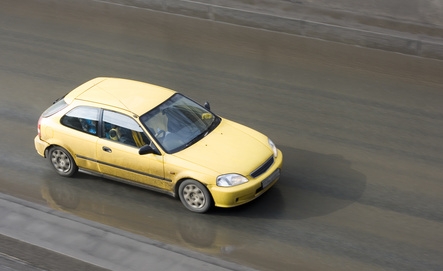
Many states require some type of annual vehicle safety inspection, and some require an emissions check as well. When a car passes these inspections, it is given a sticker denoting the month and year in which it will expire. In North Carolina, inspections have gone electronic, meaning an actual sticker is no longer required, although inspections are still annual and the results are entered into a computer database.
North Carolina's vehicle safety and emissions inspections switched to an electronic system on November 1, 2008, eliminating windshield inspection. The switch resulted from General Assembly legislation intended to increase statewide inspection compliance statewide and enhance air quality and highway safety.
Upon passing inspection, vehicles are now given an electronic authorization report, rather than a windshield sticker, and record of inspection is entered into the DMV's vehicle registration database.
Vehicles must still be inspected annually before registration can be renewed. Inspection can be completed up to 90 days before the last day of the month designated on your license plate. While all North Carolina counties require an annual vehicle safety inspection, not all require an emissions inspection.
All vehicles must pass inspection before registration renewal. Following the due date, registration renewal will be blocked and you will be fined $50 as of 2010.
If you are pulled over by law enforcement, you may receive a traffic citation for driving with an expired inspection sticker. The penalty is $100 for 1977-1980 model vehicles. If your vehicle is 1981 or newer, the fine increases to $250.
If your vehicle's inspection is expired, your registration will most likely be as well, as registration cannot be processed before the vehicle is inspected and once the inspection has expired registration will be blocked. Expired registration will incur additional fines.
To have your vehicle inspected, you must go to an authorized inspection station. These gas and repair shops are located throughout North Carolina; you can find a list online, look for a station with a sign stating it is an authorized inspection station, or ask your local mechanic if he is authorized to complete state inspections. There are fees associated with both safety and emissions inspections. Additional repair costs may be incurred if your vehicle fails these inspections.
There is a fee of $6.25 for state emissions inspection; in addition, the performing repair station may charge a fee of up to $23.75 for labor. There is a base fee of $13.60 for state safety inspection. Additionally, you will be charged a $0.85 state fee and a $12.75 station labor fee, bringing the total cost of safety inspection to $27.20. In addition, if your vehicle has after-market window tinting, you will be charged a fee of $10.00 as part of the safety inspection process.
North Carolina initiated its vehicle safety inspection program in 1966. In 2002 it also implemented an emissions inspection via the Clean Smokestacks Act, which required a reduction in nitrogen oxide emissions. Inspection stations use on-board diagnostics systems to test vehicle control of nitrogen oxide (NOx) emissions, the primary cause for ozone, acid rain and haze in North Carolina. Currently 48 of North Carolina's 100 counties require vehicle emissions inspections.